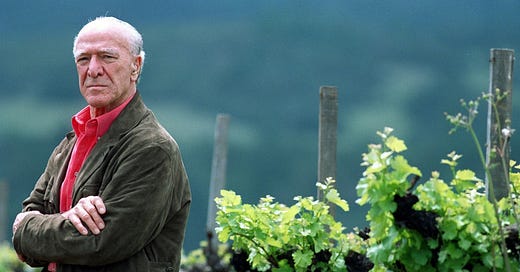The Mondavi Defense
Any pushback against the attack on alcohol, including wine, must begin with the principled Mondavi Defense
Last Friday in her WineSpeed newsletter, the great Karen MacNeil provided her readers with a quote from Robert Mondavi. It went like this:
“We believe wine is the temperate, civilized, sacred, romantic mealtime beverage recommended in the Bible. It is a liquid food that has been part of civilization for 8,000 years. Wine has been praised for centuries by statesmen, scholars, poets, and philosophers. It has been used as a religious sacrament, as the primary beverage of choice for food, and as a source of pleasure and diversion. Wine is the natural beverage for every celebration: the birth of a child, graduations, engagements, weddings, anniversaries, promotions, family gatherings, toasts between governments, and other festivities.“
The information in Karen’s WineSpeed is always well curated whether it is her facts, tips, quizzes, definitions, wine recommendations, or quotes. I never fail to read this particular newsletter and Karen’s move to a subscription model not too long ago was a no-brainer for both her and for those of us who subscribed.
The quote above comes from a Forward written for a 1989 book by Silver Oak Founder and Winemaker Justin Meyer entitled “Plain Talk About Fine Wine”.
Mondavi is making a defense of wine here. It may not seem like that from just this quote. Instead, it may simply appear to be Mondavi’s own expression of what wine means to him. But it’s more.
Directly following these words in Mondavi’s forward is this:
“There is a growing situation, however, which I believe is of great importance to all of us who enjoy wine—it is something that concerns me deeply. For the past five years, the neo-prohibitionists and anti-alcohol people have stated repeatedly that wine is a hazard and is dangerous to our way of life. This is not the truth—nowhere near the whole truth. These groups talk only of the abuse of wine—not its many benefits. When wine is drunk moderately and intelligently, it is part of gracious living. Abuse wine and just like many other things in our culture—food and medicine among them—it is bad for you.
When placed in this context, Mondavi is clearly explaining why wine demands respect, even in the face of attacks on its utility; why wine is the necessary and essential beverage, even in an age when an anti-alcohol contingent works so hard to muster evidence against its use and enjoyment; why wine must be defended lest its prodigious benefits to humanity be subsumed under the rubric of “no amount of alcohol is safe.”
The other day I wrote about the rising bias worldwide against alcohol, including wine. I wondered who would fight back and if the wine industry was in any shape to muster a defense of its product.




